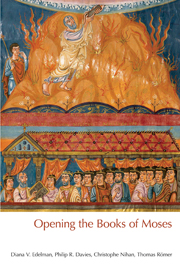Preface
Summary
The present volume is meant to be an introduction to a forthcoming new study of the Pentateuch that will look at each of the five books in turn through a Persian lens. It will focus primarily on the final form of each book and then also on editorial links that have joined the individual books into its present sequence to create an introduction about the forefathers followed by a biography of Moses. The concern will be to see how the themes of torah, ethnicity, geography, Yahweh and other deities, cult, treaty, loyalty oath and royal grant, and Moses are developed across the books as central, unifying concerns and are likely to have addressed concerns in the socio-political setting of the Persian period. This is when the books are likely to have come together to form a written core proclaiming the nature of the relationship between Yahweh and his people, Israel, in emerging forms of Judaism.
It is anticipated the entire series will be used by undergraduates and interested non-specialists, although it may be of interest to graduate students and colleagues as well. The decision has been taken to transliterate Hebrew and Aramaic terms in a way that would approximate pronunciation rather than reflect linguistic exactitude to make the books user-friendly for those without any knowledge of biblical Hebrew. The glossary and maps have also been included for the benefit of the less initiated; I am indebted to Dr Russell Hobson for generating from scratch all but one of the maps.
- Type
- Chapter
- Information
- Opening the Books of Moses , pp. viiiPublisher: Acumen PublishingPrint publication year: 2012



